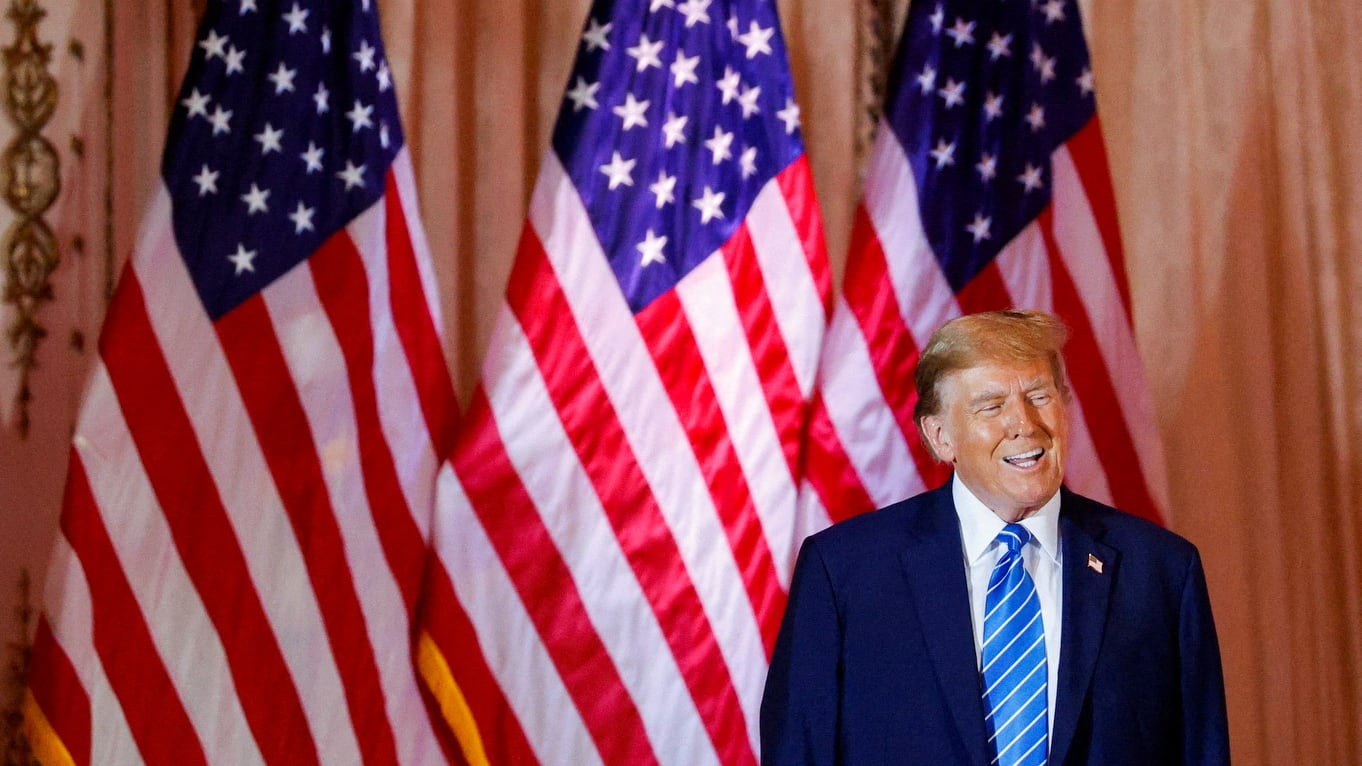When all the votes are counted this Super Tuesday, it may be remembered in the 2024 election cycle for being steeped in delegates and short on drama.
It also may be remembered for Donald Trump’s sheer dominance.
As votes came in Tuesday evening from the 15 states holding primary contests, it was clear Trump—a man facing four criminal indictments and 91 felony counts—would, as expected, come close to clinching the Republican presidential nomination by the end of the night.
In fact, his domination on Super Tuesday was so complete that his only remaining rival, Nikki Haley, would have to win virtually every vote in the remaining contests just to come near Trump’s delegate lead.
By the time all polls closed, Trump had easily won 12 states—some by commanding margins of 60 points or more—and he was on track to walk out of Super Tuesday with nearly 1,100 delegates to Haley’s 92, in a contest where he needs just 1,215. Utah and Alaska were later called for Trump too.
With so many states and delegates up for grabs Tuesday, Haley won just one contest: Vermont. It was her first state primary victory of 2024 and her second victory overall after winning the District of Columbia primary on Sunday.But it was a mostly symbolic victory for Haley and not much else. She picked up just 17 convention delegates from the state. And the former South Carolina governor was only able to crack 30 percent of the vote in two states: Massachusetts and Virginia.
Trump’s ascension to the GOP nomination—despite his four indictments, two impeachments, and an insurrection he helped lead—is now almost a sure thing. And with it, his efforts to once again remake the Republican Party in his image are nearly complete.
In a rambling speech from Mar-a-Lago on Tuesday night, Trump declared victory but garnered attention for airing grievances, like his belief that the United States is a “third world country” when it comes to elections and claiming that Joe Biden was “the worst president in the history of our country.”
"They call it 'Super Tuesday' for a reason,” the former president said. “This is a big one. They tell me, the pundits and otherwise, that there's never been one like this. There's never been anything so conclusive.”
In between various rants—at one point he claimed the U.S. was the only country that had manufacturing plants that could “take tar and make it into oil,” while at another he pointed to a group of young fans in the crowd and said they had “big fat beautiful futures”—Trump called for the GOP to come together.
“We want to have unity. And we’re going to have unity,” he said.
Haley, who stopped at least once in most of the Super Tuesday states, has insisted on remaining in the race in order to give GOP primary voters a choice. Some Republicans predicted that if she could continue to show Trump’s weakness with sizable minorities of the primary electorate, Haley could very well have a justification to campaign past Super Tuesday.
Instead, Haley is likely to face increased pressure from Republicans to end her campaign and, effectively, the 2024 Republican primary along with it.
As results came in on Tuesday, Trump loyalists were publicly pushing for Haley’s supporters to back off.
Sen. J.D. Vance (R-OH), for example, said on X that the results were a “rout” and called on donors and operatives to “unite behind our nominee.”
“Please stop wasting time and money,” Vance said.
But Haley’s team showed no signs of exiting the race, rejecting Trump’s call for unity.
“Unity is not achieved by simply claiming ‘we’re united,’” Haley’s campaign said in a statement. “Today, in state after state, there remains a large block of Republican primary voters who are expressing deep concerns about Donald Trump. That is not the unity our party needs for success. Addressing those voters’ concerns will make the Republican Party and America better.”
By the time all the results are in from the Super Tuesday slate, Republican voters will have awarded nearly a third of all delegates for the presidential nomination on one day. With those 1,215 delegates required to mathematically clinch the nomination, Trump began Super Tuesday with a little less than a quarter of that total.
Trump is expected to come close to the magic number—but only close. The former president will have to wait until next week when Georgia, Mississippi, Washington, and Hawaii hold their primaries to clinch the nomination mathematically before he officially receives it in July during the Republican National Convention in Milwaukee.
But Haley’s gambit continues to rely on the belief that, even if Trump has the delegates, he may not get the nomination. While she has avoided explicitly saying it, Haley appears to be running on the idea that Trump could be derailed by his legal problems, and her collection of delegates now—even if she has to drop out shortly—could be critical to her winning a battle at the GOP convention later.
For Biden, a good Super Tuesday would have been one that generated no headlines. In every state, the president waltzed to huge victories over Rep. Dean Phillips (D-MN) and Marianne Williamson, his meager primary opposition.
But Biden’s most formidable foe continues to be “uncommitted”—the ballot option that some Democrats are increasingly punching out of protest to the president’s support for Israel’s war in Gaza.
In Minnesota, the number of “uncommitted” ballots were hovering around 20 percent by the time three-quarters of the count was finished on Tuesday night. With native son Phillips winning some votes, Biden was on track to post his worst result of the 2024 primary in Minnesota.
In the end, though, it was a territory that may have dealt the most puzzling rebuke to Biden: American Samoa, whose six delegates were awarded to businessman Jason Palmer after their caucus. (Palmer beat Biden, 51 votes to 40.)
In a statement sent out late Tuesday evening by the Biden campaign, Vice President Kamala Harris called the election day “an energizing moment for our campaign.”
“Americans of all backgrounds are showing that they sense the urgency of this election, and that they are ready to stand with President Biden and me in this fight to protect our fundamental freedoms,” Harris said.

